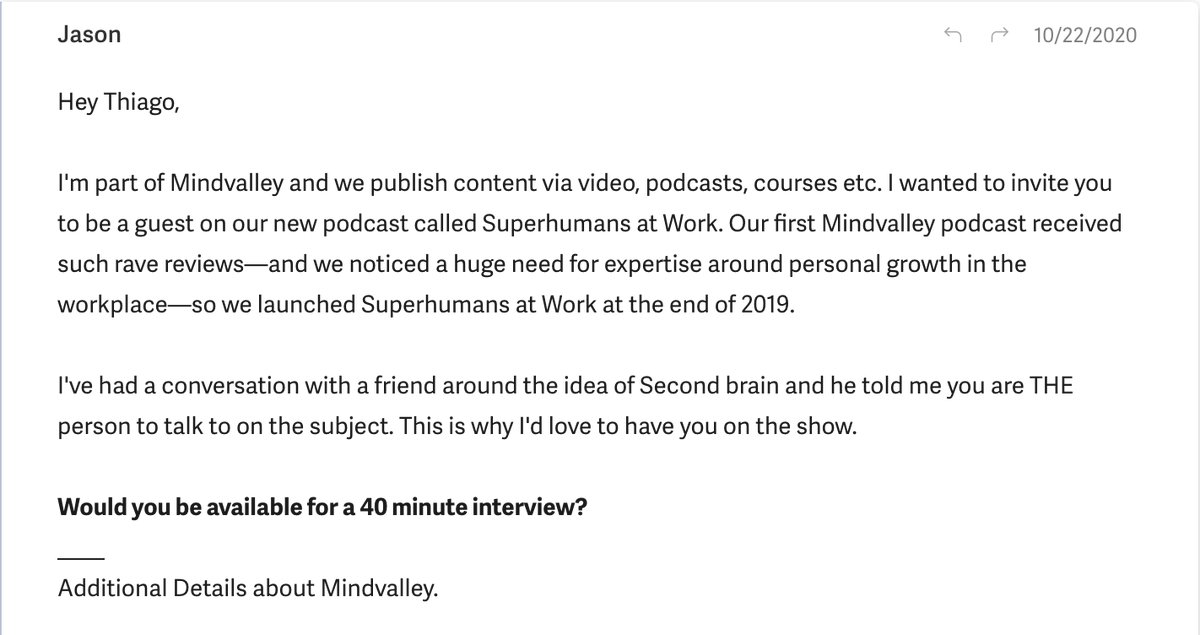
1/ I've been interviewed on over 30 podcasts over the last couple years
But the most recent one, on the Superhumans at Work podcast with @jascampbell17, was by far the best experience I've had as a guest
Podcasters, this is how you do it 👇👇👇👇
But the most recent one, on the Superhumans at Work podcast with @jascampbell17, was by far the best experience I've had as a guest
Podcasters, this is how you do it 👇👇👇👇
https://twitter.com/fortelabs/status/1366818122028617737
2/ #1 – Detailed, thorough request
Jason's initial email clearly laid out why he wanted to interview me, what it had to do with their business and show, time commitment, previous guests, audience size and demographics, avg downloads, category and ranking of the show
Jason's initial email clearly laid out why he wanted to interview me, what it had to do with their business and show, time commitment, previous guests, audience size and demographics, avg downloads, category and ranking of the show

3/ #2 – Flexibility
My first response was that I was on paternity leave, so they followed up a full 3 months later at my request. I actually missed the original time due to a power outage. Jason and team were gracious and accommodating throughout
My first response was that I was on paternity leave, so they followed up a full 3 months later at my request. I actually missed the original time due to a power outage. Jason and team were gracious and accommodating throughout
4/ #3 – Automated booking
Scheduling link not only allowed me to pick a time, but triggered a series of automations that set expectations, asked me to meet certain AV standards, and provided guidance to join early to run tests
Scheduling link not only allowed me to pick a time, but triggered a series of automations that set expectations, asked me to meet certain AV standards, and provided guidance to join early to run tests
5/ #4 – Written brief sent in advance
They sent me a detailed brief with their background research on me and my work. Copied and pasted from my bio, website, and blog, it allowed me to see how they were framing the episode and what they wanted to focus on
They sent me a detailed brief with their background research on me and my work. Copied and pasted from my bio, website, and blog, it allowed me to see how they were framing the episode and what they wanted to focus on

6/ #5 – Live audience with 3 kinds of interaction
Interview was recorded on Zoom for a live audience of several hundred, which creates an unmistakable energy and excitement that is hard to re-create 1-on-1
Interview was recorded on Zoom for a live audience of several hundred, which creates an unmistakable energy and excitement that is hard to re-create 1-on-1
7/ #6 – Multiple kinds of interaction
Call was divided into 3 sections: 30m presentation on my methodology; 30m of audience Q&A; and 30m of open discussion w/ attendees (which I left for)
This created natural transitions and allowed interaction w/out taking too much of my time
Call was divided into 3 sections: 30m presentation on my methodology; 30m of audience Q&A; and 30m of open discussion w/ attendees (which I left for)
This created natural transitions and allowed interaction w/out taking too much of my time
8/ #7 – Incredible introduction
Most hosts are afraid to pump up guests too much. Maybe they don't want to be seen as hypey. But starting on such an enthusiastic, positive, personalized note (instead of reading a cold bio) really made me feel welcome and excited
Most hosts are afraid to pump up guests too much. Maybe they don't want to be seen as hypey. But starting on such an enthusiastic, positive, personalized note (instead of reading a cold bio) really made me feel welcome and excited
9/ #8 – Pre-made assets for multiple social networks
Team sent me a whole GDrive folder full of assets: links to episode on all podcast platforms, social handles to tag them with, pre-formatted images for multiple social media networks, & even Instagram videos with key excerpts
Team sent me a whole GDrive folder full of assets: links to episode on all podcast platforms, social handles to tag them with, pre-formatted images for multiple social media networks, & even Instagram videos with key excerpts

10/ Incredibly, many podcast hosts never even sent me the episode once it was finished. Not only is that a basic courtesy, but I'm by far the best distribution channel for my own episode!
Make it as easy as humanly possible for the guest to share the episode
Make it as easy as humanly possible for the guest to share the episode
11/ This might seem like a lot, but podcasts are maturing as a medium, and this will increasingly be the new standard needed to book the best guests
Podcasting is reaching many millions of people now, and it's time to do it like a professional
Podcasting is reaching many millions of people now, and it's time to do it like a professional
• • •
Missing some Tweet in this thread? You can try to
force a refresh


